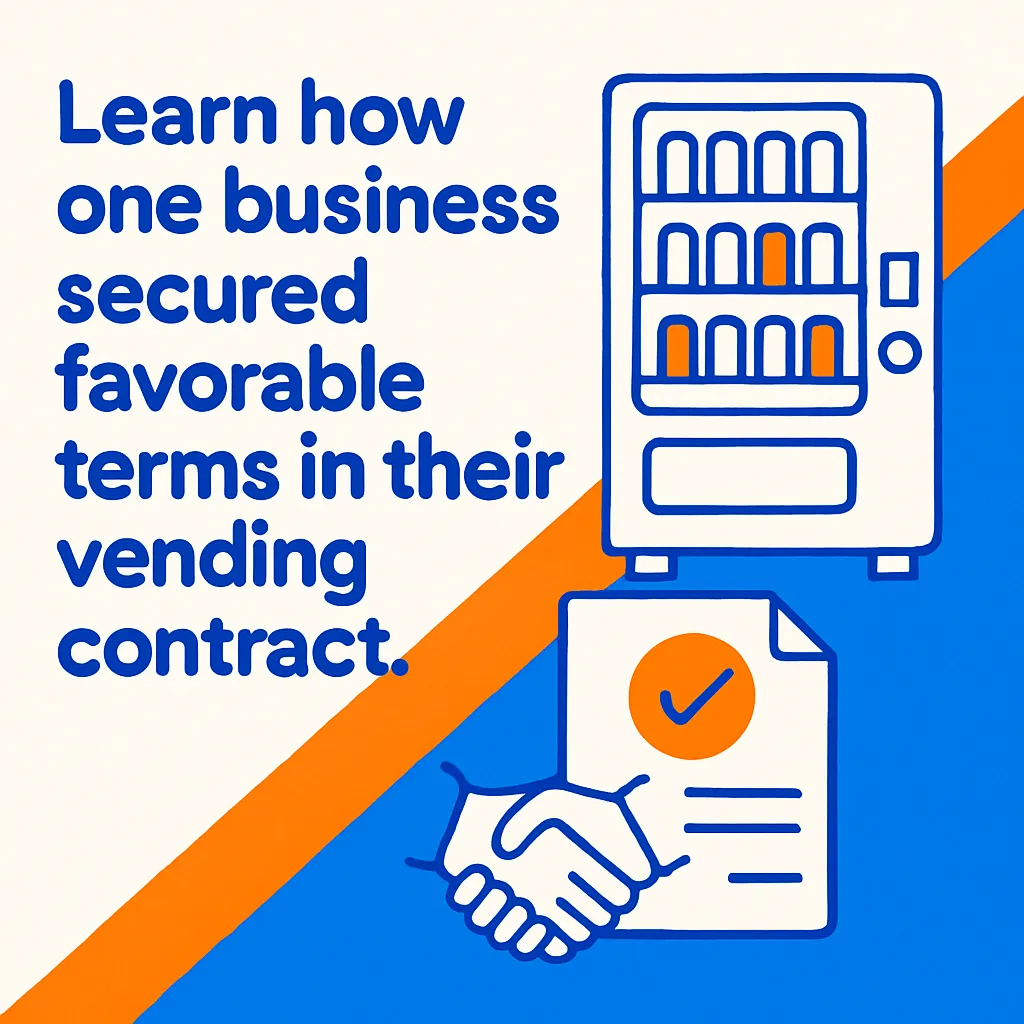Case Study: Successful Vending Contract Negotiation
Learn how one business secured favorable terms in their vending contract.
Back to Vending Contracts ResourcesLearn how one business secured favorable terms in their vending contract.
Back to Vending Contracts ResourcesThis case study examines the steps taken by a forward-thinking business to renegotiate their vending contract, resulting in improved service, better product selection, and increased revenue.
![]() Increased commission rates by 5%
Increased commission rates by 5%
![]() Expanded healthy snack and beverage offerings
Expanded healthy snack and beverage offerings
![]() Secured improved service level agreements and product rotation
Secured improved service level agreements and product rotation

In today's competitive business landscape, every operational detail can impact employee satisfaction and financial health. This case study delves into how one business transformed its vending services from an overlooked amenity into a valuable asset through strategic contract negotiation. The keys to their success lay in meticulous preparation, understanding market dynamics, and clear communication of their needs and performance expectations. For businesses considering their own vending contracts, understanding typical inclusions can be crucial. Delve deeper into how vending contracts work to prepare your strategy.
The business began by conducting an internal audit of their current vending machine usage. This included analyzing sales reports to identify popular products and slow movers, surveying employees about their preferences (especially regarding healthier options), and collecting feedback on machine reliability and service response times. This data provided a strong foundation for their negotiation, allowing them to present specific, data-backed requests rather than vague complaints. This thorough research is similar to the approach needed when evaluating a new vending location, where data points guide decision-making.
Armed with detailed insights, the business invited bids from several vending providers. This competitive process was critical, as it forced vendors to offer their best terms to win the contract. They didn't just focus on commission rates; they evaluated service level agreements, product variety, machine technology upgrades (like cashless payment systems), and the vendor’s commitment to addressing employee feedback. Understanding the role of various vending partners and how vending management companies select vendors can further enhance this process.
The negotiation phase involved presenting their consolidated data and desired outcomes to the shortlisted vendors. Key negotiating points included a demand for a 5% increase in commission, a commitment to quarterly product rotations to keep offerings fresh, and a service clause guaranteeing a rapid response to machine malfunctions. By highlighting the potential for increased sales through tailored product selection and reliable service, they demonstrated how meeting their terms would also benefit the vendor. Crafting a solid proposal is an art; learning how to write a vending machine proposal can make all the difference.
The successful negotiation resulted in a new contract that not only significantly increased the business's passive revenue but also dramatically improved employee satisfaction. The introduction of healthier snack and beverage options, faster service response times, and state-of-the-art machines made the breakroom a more appealing and convenient space. This case study underscores that vending contracts are not static agreements but dynamic opportunities for businesses to enhance their facilities and support their teams effectively. For ongoing optimization, businesses might also explore services that monitor and adapt to demand, similar to insights on how office managers benefit from vending services.
The primary goal was to secure more favorable terms, including better commission rates and a wider variety of healthy options, without increasing costs for the business.
They thoroughly analyzed existing sales data, surveyed employee preferences, researched market rates for vending commissions, and identified key pain points with the previous service.
The business leveraged competitive bids from multiple vendors, highlighted specific employee demands, and proposed a structured multi-year agreement with performance incentives for the vendor.
One challenge was overcoming the incumbent vendor's reluctance to offer healthier product options without increasing prices. This was addressed by demonstrating high employee demand for such items.
The new contract included a 5% increase in commission rates, a guaranteed minimum percentage of healthy product offerings, and a clause for regular performance reviews and product rotation based on employee feedback.
Employees gained access to a wider range of desired snacks and beverages, including healthier choices, leading to increased satisfaction and convenience in the workplace.
The increased commission rates generated additional passive income, and improved employee morale contributed to a more positive work environment, though this is harder to quantify directly.
It is generally recommended to review and potentially renegotiate vending contracts every 2-3 years, or whenever there's a significant change in employee count, preferences, or market conditions.
Always do your homework! Understand your needs, gather data, solicit competitive bids, and be prepared to articulate your value and non-negotiables clearly and respectfully.
Yes, part of the negotiation included upgrading to machines with modern payment systems, including cashless and mobile payment options, to enhance user convenience.